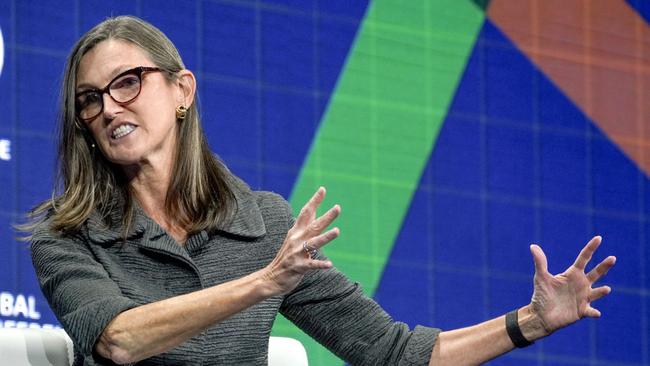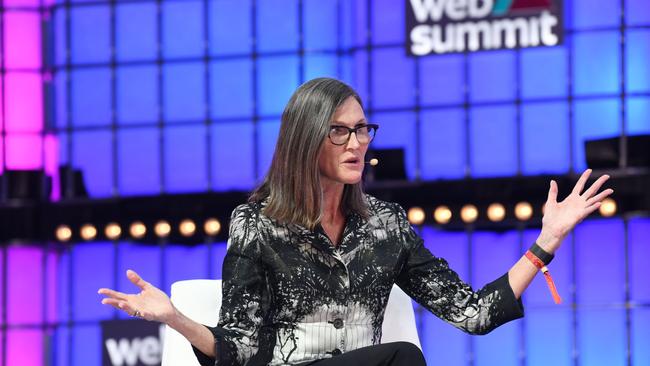Tech giants are ripe for disruption, says investor Cathie Wood
She’s a big fan of Tesla and Meta but ARK Invest chief and founder Cathie Wood says some of the tech giants which make up 30 per cent of the S&P 500 are vulnerable to disruption.

Famed tech investor Cathie Wood has a problem with Google.
“I have always hated searching on Google, mostly because I’m doing research and it doesn’t understand what I’m doing,” Ms Wood told The Australian ahead of her presentation to the Sohn Hearts & Minds conference in Sydney on Friday.
“If I put a question into ChatGPT or GPT-4, I get the answer and I don’t need an intermediary, so Google’s not going to get any advertising dollars off of me because I hate their search engine.
“Now it is true they’re getting better … they’ve been forced to get better because of ChatGPT.
“So if I ask a very straightforward question, I’ll get the answer at the top, but if it’s a research question and I need to understand a little bit, it’s (Google) is kind of dumb, and GPT-4 is quite smart.”
She is a big fan of Tesla and Meta Platforms, but the ARK Invest chief executive and founder said some of the tech giants that make up 30 per cent of the S&P 500 were vulnerable to disruption.
Overall, her view is that Google could be “disintermediated”.
Ironically, she said Google had the best AI engineers in the world because it bought DeepMind.
But if ChatGPT was going to disintermediate Google, Alphabet was facing an “innovator’s dilemma”. She says: “You know it has the best AI experts, but is it going to let them destroy its advertising model?”
Tesla ranks second across ARK portfolios as Ms Wood saw it as “the biggest AI project” in the world”.

Meta Platforms has crept up the ranks as she’s impressed by how it’s using open-source AI to inform its products. Nvidia still has a modest weight, but is no longer held by the flagship ARK Innovation fund.
Other Magnificent Seven stocks such Google’s parent Alphabet, Amazon, Apple and Microsoft are well down the list.
In 2014, Ms Wood established ARK Invest to revolutionise the world of active stock portfolios by converting them into exchange-traded funds. She was an early backer of Tesla.
To the surprise of the audience, she famously picked Tesla at Sohn Hearts & Minds in 2019.
Tesla shares went on to rise 19- fold from there and Ms Wood achieved guru status, with help from bitcoin and other emerging stocks like Nvidia.
She did it again with her Sohn tip on Teladoc Health in 2020 as it soared during Covid.
But Teladoc shares fell back to earth when concern about the Covid pandemic peaked in early 2021.
Apart from Google, Ms Wood also saw Amazon as a major target for disruption.
Amazon Web Services – which invented cloud computing – has seen its growth rate drop to 12 per cent, while Microsoft’s growth rate has accelerated to the high 20s, thanks to Azure.
“So that’s cloud disintermediation, perhaps, especially as Microsoft – with open AI – might have an advantage,” Ms Wood said. “But when it comes to Amazon, their advertising business is extremely profitable, and what can GPT-4 do for us with shopping? Find, from any website in the world, the cheapest item, and it’ll just take you there, without all the sponsored advertising.”
Any such displacement would take time because of Amazon’s excellence in fulfilment. But she saw competitive threats from operations such as Flexport’s self-service, AI-driven global trade solution for finance, freight and fulfilment, after it bought Shopify Logistics assets.
Nvidia was “way ahead of the pack” but “the pack is coming after them”.
ARK started buying Nvidia at $US5 a share in 2014 when it saw how central it was going to be to AI. Now, at $US500 a share, Nvidia remains in ARK’s more specialised portfolios, but not the flagship ARK Innovation fund.
“It has been primarily a hardware play, trying to get more into the software side, but for every dollar spent on AI hardware, we believe 20 will be spent on AI software,” Wood says.
“So we have been putting in the portfolio more software-oriented companies that have nowhere near the valuation of Nvidia.”
More broadly, ARK was “looking at all companies through an AI lens”. It looked for four attributes to be sure a company in question had “serious domain expertise”.
“When you talk about the multiomics space, you’re not just talking about DNA, RNA, proteins, methylation, but epigenetics and it’s just complicated – serious domain expertise,” she said.
She then looked at whether a company had AI expertise and good distribution, preferably globally. Once they had those attributes, the most important criterion was whether they had proprietary data. “Data is the new gold … it is extremely valuable, especially if no one else has it,” she said.
Companies that she backs are using foundation AI models to develop their own specialised models, based on their own data, to generate better products and services and enhance productivity.
“AI is the lens and those four criteria are the variables we’re using as we’re populating the portfolios. Almost all of the stocks in the portfolio have some AI bent to them.”
Bitcoin journey ‘has hardly begun’, says its true believer
Cathie Wood has for many years been bullish on cryptocurrencies.
Despite the peak in the cryptoverse that came as interest rates soared after the pandemic, the ARK Funds founder and CEO sees positive signs for the asset class and bitcoin in particular.
In the past year, bitcoin has taken off again, rising from about $US15,500 to $US37,954.
While still a long way from its record high of $US68,990 and her “base case” forecast of $US600,000, Wood is encouraged by the positive reaction of bitcoin to the US regional banking crisis in March.
Her bull case for bitcoin is a staggering $US1.5m. But sceptics should bear in mind that ARK first got involved in bitcoin in 2015, when it was trading around $US250. It rose 276-fold from there.
Unlike Nvidia, on which ARK has cooled this year, Wood says bitcoin has “hardly begun its journey”.
“It’s digital gold, it’s fulfilling that role, and we think it could become 50 per cent as big as the gold market in our bull pace, which takes it to $US6 trillion ($9.3 trillion),” Wood tells the Australian.
But she sees two “bigger opportunities” for bitcoin in terms of “use cases”.
The first major use case she sees is institutional investors moving into a new asset class with low correlation to other assets, except perhaps in major crises. March was a good test as bitcoin became a “risk off asset”, as it has no counterparty risk.
“Portfolio managers used to think it was a Ponzi scheme, but we now have 10 years of history,” Wood says. “As Stanley Druckenmiller says, it’s now a brand. Unlike gold, when the price goes up, you’re not getting more production than is mathematically metered today, and we’re going to see a halving of supply growth in the next five to six months.”
She thinks institutions will end up putting anywhere from 2-6.5 per cent in their portfolios.
“In any new asset class – and I’ve been through three iterations of this: real estate in the ’70s and ’80s; emerging markets in the ’80s, ’90s into the 2000s, especially with China; and now crypto –- you’ll see institutions start with 1 per cent.”
Her other use case is based on her view that emerging markets populations very often have their wealth wiped out by hyperinflation and corrupt regimes. “This is an antidote to that and we do believe that bitcoin will effectively become the money supply for emerging markets,” she argues.
Sohn Hearts & Minds is on track to have raised $60m by November and all profits will go to medical research. The Australian is a media partner. Tickets are on sale now at sohnheartsandminds.com.au and tune into theaustralian.com.au for live coverage on Friday.



